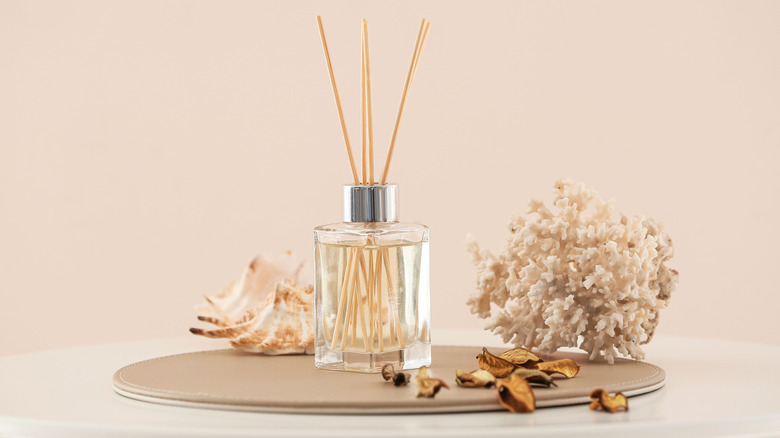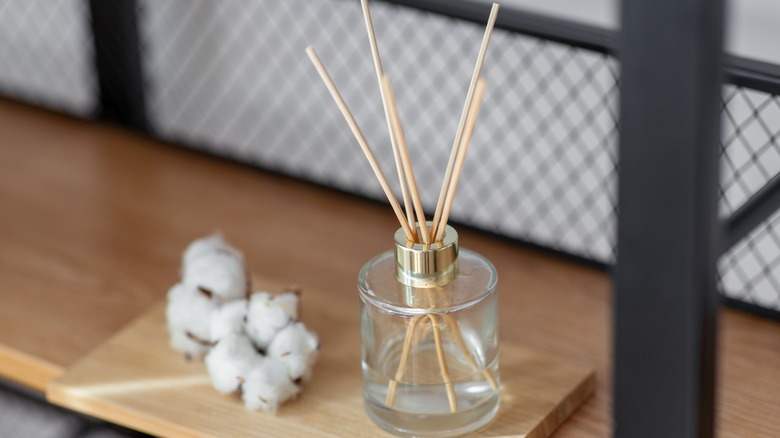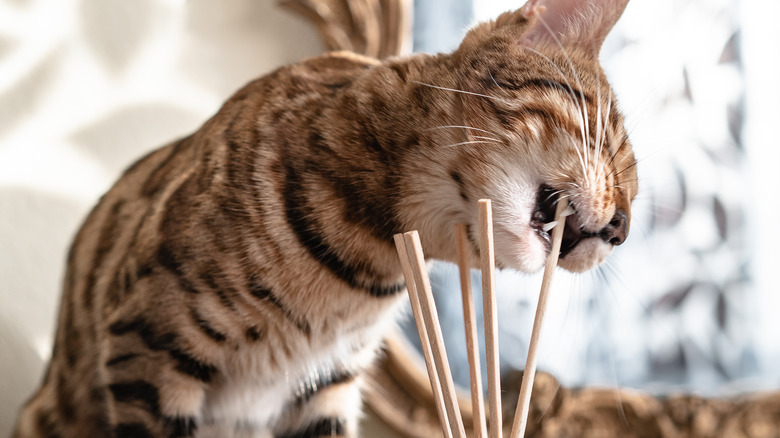Why You Should Stop Using Reed Diffusers Immediately
Scented products are a great way to not only freshen up your house and rid it of unpleasant odors but set a specific mood and atmosphere. There's even a psychological benefit to adding scents to your home, according to Travel and Leisure, which states that scented candles stimulate the limbic system of your brain, in turn releasing hormones like serotonin and dopamine.
Candles aren't for everyone, though, whether you're scared of the fire hazard, have sensitive lungs, or you simply aren't allowed to burn them. Luckily, there are a variety of other flameless scented products, among the most popular being reed diffusers.
Reed diffusers consist of a glass bottle with a slim neck filled with scented oil and reed sticks that fit snuggly at the neck. The reeds suck up the oil and diffuse them into the air naturally — no electricity or flames required (via Essence of Harris). Unfortunately, reed diffusers may not be the safest option for every household.
Reed diffusers have unsafe chemicals
If you have young children, reed diffusers are arguably safer than candles or wax melts — there isn't any flame, electricity, or hot wax involved, which could easily harm a child. However, reed diffusers are still very dangerous if not properly stored out of reach of young children and pets.
As stated earlier, reed diffusers are made up mainly of essential oils that release a pleasant scent into the air. However, the ingredient that helps disperse the oil's scent is usually isopropyl alcohol, according to Poison Control.
Not all essential oils are toxic if ingested, but common scents like lavender and eucalyptus are. They can cause symptoms as mild as mouth irritation and gastrointestinal upset and as severe as drowsiness, tremors, and seizures. Isopropyl alcohol can cause skin and eye irritation if touched, and swallowing it can cause diarrhea, vomiting, internal bleeding, and, in extreme cases, dehydration, shock, and coma (via Poison Control).
Reed diffusers are dangerous for pets
Even if you don't have children, you may want to think twice about having a reed diffuser in your home if you have pets. Again, they're theoretically safer than candles — your cat knocking over a bottle of oil is a lot less dangerous than a lit candle. However, the respiratory systems of cats and dogs are much more sensitive than ours, and the essential oils in reed diffusers can cause major issues for your furry friends.
According to House Fragrance, citrus smells can be very dangerous for cats, causing hallucinogenic effects and creating breathing troubles. Oil scents like cinnamon, eucalyptus, lavender, clove, spruce, tea tree, peppermint, thyme, and, of course, citrus, are detrimental to their health if dispersed in the air. There's an even bigger threat if the animal gets into the oil and isopropyl alcohol mixture. Even if they don't, the particles can land on their fur and become ingested as they clean themselves.
The same goes for dogs. Canines are particularly sensitive to scents like tea tree, thyme, juniper, winterberry, clove, rosemary, and garlic — although you likely won't be diffusing the last one in your home anytime soon. If you plan on keeping a reed diffuser, keep it well out of reach of any pets and check with your vet that the scents used are safe for their sensitive respiratory systems.


